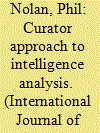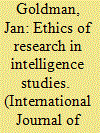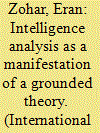|
|
|
Sort Order |
|
|
|
Items / Page
|
|
|
|
|
|
|
| Srl | Item |
| 1 |
ID:
122918


|
|
|
|
|
| Publication |
2013.
|
| Summary/Abstract |
Despite the potentially horrific implications of failure, counterintelligence (CI) is often viewed as the stepchild of the United States Intelligence Community (IC). The assertion has often been that CI in the U.S. has never worked due to the American culture and its frequent association with "mere" security. This was made even worse in many cases by the IC's shift from a counterespionage posture to a counterterrorism focus after the 11 September 2001 (9/11) attacks, 2 thereby creating unique challenges for CI managers. Unfortunately, relatively little focus has been placed on providing CI managers with useful ways to conceptualize and meet the unique day-to-day challenges they face.
|
|
|
|
|
|
|
|
|
|
|
|
|
|
|
|
| 2 |
ID:
116387


|
|
|
|
|
| Publication |
2012.
|
| Summary/Abstract |
The United States Intelligence Community (IC) is drowning in information. Analysts are losing the war against volume. The next huge "big mistake" won't come from a failure to connect the dots, but instead from missing dots buried in a mountain of noise. Every day, reports from human sources, satellite photography, and signal intercepts flood analysts in growing volumes. In the past decade, this classified flood has been doubled by a tsunami of "open source" information (OSINT)-unclassified, publicly available information from publications, blogs, YouTube videos, Twitter feeds, and so on. Over the past decade, the IC has learned to better collect and use OSINT in its analysis. Though armed with the most expensive and elaborate high-tech tools to manage big data, the IC is running faster to stay in the same place.
|
|
|
|
|
|
|
|
|
|
|
|
|
|
|
|
| 3 |
ID:
119418


|
|
|
|
|
| Publication |
2013.
|
| Summary/Abstract |
Eleven years later, the United States Intelligence Community (IC) has yet to recover from the 11 September 2001 (9/11) attacks on the Pentagon and New York City-and from the decade old-issue of Iraqi weapons of mass destruction (WMD), at least in terms of how its member agencies do analysis. Many words have been said and written, and many changes have been put into place but the country's leadership has gone down as many blind alleys as it has found ways to make improvements. Indeed, much of the current thinking about analysis arguably spends much too much time on what might be called mechanical issues-especially the search for ever better programs to parse more and more data-and much less on the intellectual core of analysis. This is understandable, as building computer programs is much easier than thinking about thinking and how to improve it. So, based on my many years inside and around the IC, I offer some principles for discussion and debate to get the constituent agencies back to the heart of analysis, which involves good thinking about difficult subjects.
|
|
|
|
|
|
|
|
|
|
|
|
|
|
|
|
| 4 |
ID:
158765


|
|
|
| 5 |
ID:
119423


|
|
|
|
|
| Publication |
2013.
|
| Summary/Abstract |
The often voiced criticism in academic and intelligence circles is that intelligence analysis lacks a structured methodology and relies on the intuition, impressions, and insights of analysts. In making these criticisms, the International Relations academic discipline attempts to credit itself with intelligence analysis while ascribing the failures of the United States Intelligence Community (IC) to the realm of intelligence analysis. Yet adopting models from other disciplines and launching "a revolution" in the thinking and methodologies of intelligence analysis is unnecessary. Intelligence analysis, particularly the basic kind, benefits from a rich and well-founded methodology that has emerged from analytic ranks.
|
|
|
|
|
|
|
|
|
|
|
|
|
|
|
|
| 6 |
ID:
139506


|
|
|
|
|
| Summary/Abstract |
Today, as often in the past, the United States Intelligence Community (IC) continues to be a target of criticism for activities—interrogations and renditions—that appear to shock the conscience of many in the public as well as for developing surveillance capabilities that could violate the civil liberties of United States residents. Intelligence agencies are often portrayed as undermining the larger values of American society, pervaded by law-breaking and incompetence, and making only incidental contributions to the national security. Much of the academic literature on intelligence is narrowly focused on intelligence “revelations,” organizational histories of particular agencies, and on biographies of significant spies.
|
|
|
|
|
|
|
|
|
|
|
|
|
|
|
|
| 7 |
ID:
123999


|
|
|
|
|
| Publication |
2013.
|
| Summary/Abstract |
The United States Intelligence Community (IC) has had more than a decade to reflect on its failure to predict the catastrophic events of 11 September 2001 (9/11). Nearly as much time has passed since the IC's mischaracterization of Iraq's weapons of mass destruction (WMD) program, a mistake that led to the costly expansion of what became the war on terrorism. More cause for recrimination followed when key U.S. decisionmakers seemed to fundamentally misunderstand what was required to pacify Iraq and Afghanistan. The wars in both countries hit repeated snags that should have been seen going in. How could the intelligence analysts who were supposed to have briefed U.S. leaders on the risks of these undertakings have left their audiences so poorly informed?
|
|
|
|
|
|
|
|
|
|
|
|
|
|
|
|
| 8 |
ID:
119435


|
|
|
|
|
| Publication |
2013.
|
| Summary/Abstract |
Religion has seriously affected the gathering of intelligence since Biblical times. Beginning post-World War II with the rise of the state of Israel, however, religion began to become a direct political issue for the first time since the Middle Ages. The 1979 Iranian revolution brought this development to center stage, as practitioners of diplomacy were forced to study the interaction more carefully. The United States Intelligence Community (IC) understood some of this at the tactical level, but like the diplomatic community, has been slow to comprehend how fundamentally religion changes geostrategic considerations, hinders collection, impacts analysis, and changes the nature of covert operations, especially at the strategic level where politics, diplomacy, and intelligence intersect. To meet the challenge, the Intelligence Community and most statesmen need to develop much better understanding of religion's interplay with diplomacy among those at the upper levels who affect the direction of national policy.
|
|
|
|
|
|
|
|
|
|
|
|
|
|
|
|
|
|
|
|
|